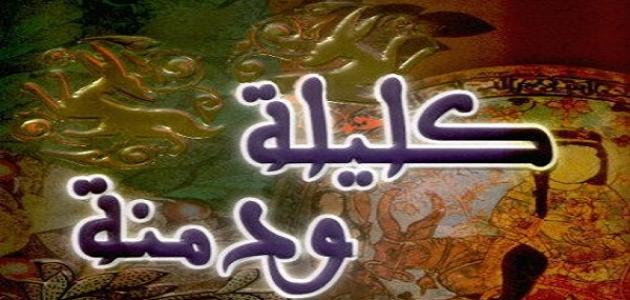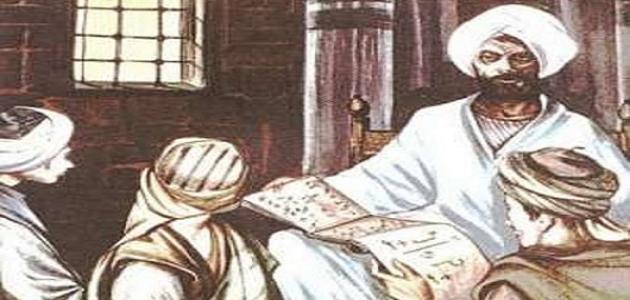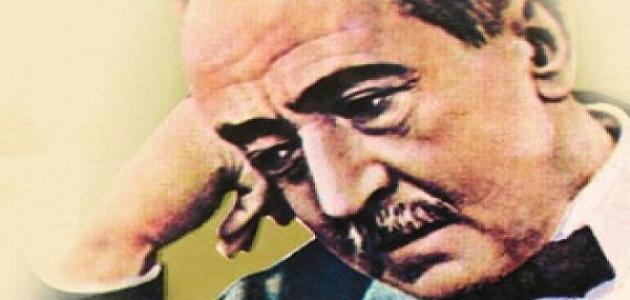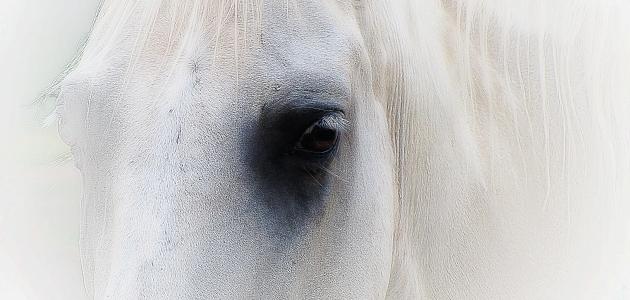Kalila wa Dimna book
The book Kalila and Dimna is considered one of the most famous international books that has received wide attention from scholars and researchers. The story of the book Kalila and Dimna is told on the tongues of animals and birds. It is an ancient book dating back to the Abbasid era, of Indian origin. It was originally called The Five Chapters, where it was written. Abdullah bin Al-Muqaffa translated it from Persian to Arabic, and added other stories to it.
Characters of the book Kalila and Dimna: Wild animals: the lion plays the role of the king, his servant is a bull named Shatraba, Kalila and Dimna are two jackals, and many other characters. The events of the story take place in the forest on the tongues of these animals, as these animals symbolize originally human characters, and it tells the story of the relationship between the ruler and the ruled, and it also calls for adhering to morals, and adhering to good customs and principles.
The philosopher Bedia wrote this book for King Debishlaim; Because he was unjust and tyrannical towards his subjects, Bidba the Wise found a way to advise him of this idea in order to prevent him from oppressing the subjects, and guide him to justice and fairness. So he went to him and told him the ruling and the proverbs that talk about justice and fairness, so he put him in prison, then he was amazed by his wisdom and took him out of prison. He took him to redress the grievances of the subjects, solve their problems, and bring justice between the strong and the weak. When Bidba accomplished what he wanted of removing injustice from the subjects, he devoted himself to writing policy books and principles of governance. King Debshalim continued to work as the philosopher Bidba indicated, so his rule was established and the subjects were saved, and the king devoted himself to looking into matters. Philosophy, wisdom, and knowledge. So he asked Bidba to write him an eloquent and eloquent book in which he would devote his mind. Its apparent meaning would be the policy and discipline of the common people, while its inner meaning would be the morals of kings, their rule over subjects, and their command to obey the king and serve him. So the subjects would be freed from the injustice and oppression that kings committed against them, and the king wanted this book to remain after his death so that it would be a memory of him throughout time.
Read also:Bahauddin ZuhairThe book Kalila and Dimna is considered one of the books that serve three categories of people. It is considered an entertaining and interesting book for simple people and those who read for pleasure. It is also considered useful for the wise because of the wisdom and philosophy it contains on the social and cultural level. It also serves the educated category because of the eloquence it contains. And linguistic eloquence. Although the book Kalila and Dimna is one of the oldest books, it has a great impact on the hearts of rulers and officials. Because he laid the foundations and rules of governance based on good morals, justice and fairness.
Author of the book
Abu Muhammad Abdullah Roozbeh bin Dazawayh, known as Ibn al-Muqaffa, was born in the city of Jor, known as Firozabad today. His father was nicknamed al-Muqaffa because he was accused of stealing the tax money. He hit al-Hajjaj on the hand and it convulsed and contracted (i.e., swollen). Ibn al-Muqaffa grew up in Persia and was a Magian. He learned from the Persian culture and excelled in the Fahlawi language (ancient Persian). In this matter, he benefited from his father, who worked as a tax collector and was one of the writers of poetry collections who were the best at proficient in Persian culture. Accordingly, he copied literature books. From Persian to Arabic, the most important of which is the book Kalila and Dimna, translated from Hindi into Pahlavi and then into Arabic. He left a wonderful impact of literature, the most famous of which is the Book of Great Literature, in which he talks about the Sultan and his relationship with the subjects, and the Little Book of Literature, which talks about refining and taming the soul.
Read also:Definition of proseHe moved to Basra, which was known for its science and literature circles, and linguistic and poetic markets, and which was known as the greatest center of Arab-Islamic culture at that time. He met scholars of language, jurisprudence, and hadith, linguists, and eloquent Bedouin narrators, and this was the secret of his proficiency in the Arabic language.
Historians differed regarding the story of the killing of Ibn al-Muqaffa, but the majority indicated that al-Mansur ordered his governor in Basra, Sufyan ibn Muawiyah, to kill him because of a book written by Ibn al-Muqaffa that angered al-Mansur. Muawiyah carried it out with open arms because he had a deep-seated grudge against him, and that was in the year 759 AD. .
From the stories of Kalila and Dimna
Door to the hermit and the guest
(The king said to the philosopher: I heard what you mentioned about a man who refrained from harming others because of harm befalling him or a calamity befalling him. So tell me if you see someone who abandons the work that suits him and disputes with him and asks for something else but does not achieve it, so he returns to what he had in his hand, but he does not have the power to do so, and remains confused and hesitant.
The philosopher said: They claimed that there was a diligent hermit in the land of Karkh, and a guest came to visit him one day, and he called for some dates to give him something, so they all ate from it. Then the guest said: How sweet and delicious this fruit is, and there are no palm trees in the country in which I live, and I would like to take some of it and plant it in our land. The hermit said: You have no great benefit from this, and perhaps the palm trees are not compatible with your land. Your country has many fruits, despite the quality of dates and their lack of compatibility with the body. Then the hermit said to him: He is not considered happy if he is in need of what he cannot find and is not excused for it, so his soul is upset about that and his patience becomes less and less difficult for him, and the burden of that and his taking advantage of what harms him and makes it difficult for him is not considered happy. You are very fortunate and very fortunate if you are content with what you have been provided with and abstain from what you cannot achieve and do not realize what you seek from it. The guest said: You have succeeded and guided, and I heard strange words from you that I liked and approved of. If you teach me it, I have a desire for it and a desire to know it. The hermit said: I am not worthy of you to fall in with what you left out of your words and use Arabic language in the same way as the crow did.
Read also:Lyrics Diary of a Defeated ManThe guest said: How was that?
The hermit said: They claimed that a crow once saw a partridge walking and liked its gait and was eager to learn it and was satisfied with it but was unable to control it. So he went back to his usual walk, and he had forgotten it and became confused and hesitant. He did not want what he asked for and did not improve what he had in his hands, so he became the ugliest bird in his walk.
I have given you this example so that you may know that you are worthy, if you abandon your tongue upon which you were inculcated and devoted yourself to it, and devoted yourself to learning the Hebrew language that does not differ from you, not to comprehend it and forget what was in your hands other than it. It has been said: “He is considered ignorant if he attempts things that do not resemble him and are not among his family, and his fathers and grandfathers before him did not realize it and did not know about it before.”
The philosopher said to the king: The governors, due to their lack of commitment to the subjects in this and similar matters today, are worse in terms of their management of people moving from one house to another, leaving them what they needed and living in it under the rule of kings, and the people of the lower class seeking the ranks of the upper class, and the spread of affairs, and the corruption of etiquette, and the quarreling of the mean with the noble. . Then things go on like this until they end in the great and grave danger of competing with the king in his kingdom and opposing him in it.
epilog
(When the king and the philosopher reached the door of the dove, the fox, and the heron, the king remained silent, and the philosopher said: You, O king, lived a thousand years, and ruled the seven regions, and you were given a reason for everything, and you were so happy with your subjects, and among them was the apple of your eye, and a share of destiny and destiny, for the dream has been perfected in you. And your mind and memory are sharpened, and courage and generosity are perfected in you, and your mind, speech, and intention agree, and there is no deficiency in your opinion, nor is there any error in your saying, nor is there a flaw in your action, and you have combined help and gentleness, so you will not be found to be a coward when meeting, nor short-hearted about the things that trust you. I have explained the matters to you and summarized for you the answer to what you asked me about. I have worked hard for you in my opinion, my view, and the extent of my acumen to seek the fulfillment of your need. So fulfill my rights in good faith, by applying your thought and the generosity of your nature and reason in what I have described to you. Indeed, the one who commands good is not happier with it than the one who obeys him in it. Nor is the one who advises him. He is more deserving of advice than he who is given it. The learner is not further from knowledge than the one who teaches him. And whoever meditates on this book with his mind and acts on it in his opinion with originality from his own thought, will attain great levels and important matters, with the help of fate and his time when it comes, so that he will not tire of anything and stop looking at it and contemplating it.
May God grant you success, O King, and guide you, and correct what was corrupt in you, and calm what was sharp from your harshness, and bestow mercy upon your souls and the souls of your pure fathers who have passed away, the people of the House of reason, etiquette, virtue, generosity, and generosity.









